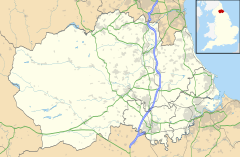Holwick facts for kids
Quick facts for kids Holwick |
|
|---|---|
| OS grid reference | NY905269 |
| Unitary authority | |
| Ceremonial county | |
| Region | |
| Country | England |
| Sovereign state | United Kingdom |
| Post town | Barnard Castle |
| Postcode district | DL12 |
| Police | Durham |
| Fire | County Durham and Darlington |
| Ambulance | North East |
| EU Parliament | North East England |
| UK Parliament |
|
Holwick is a tiny village in Teesdale, County Durham, England. It's nestled in the beautiful Pennine hills. The village is made up of a few houses spread out along a road, like a long line. Not many people live here; in 2011, there were fewer than 100 residents.
Even though it's in County Durham now, Holwick used to be part of Yorkshire. This change happened in 1974. In 2013, a new flag for the North Riding of Yorkshire was shown for the first time right here in Holwick!
The village has a pub called the Strathmore Arms and a campsite. Holwick is close to the River Tees, about 2 miles north-west of Middleton-in-Teesdale. You can also find the amazing High Force and Low Force waterfalls nearby. The area around Holwick is mostly high moorland and fells, which are open, rocky hills.
Holwick's Location and Government
How Holwick is Governed
Holwick is part of the Bishop Auckland area for parliamentary elections. This means people in Holwick vote for a Member of Parliament (MP) to represent them in the UK government. Currently, the MP for this area is Dehenna Davison.
The local police force for Holwick is Durham Constabulary. The closest police station is in Barnard Castle.
Holwick's Past: A Look Back in Time
The very first signs of people living in the Holwick area are from over 6,000 years ago. These early people were hunters who visited during the summer. They left behind tiny stone tools called microliths.
Later, during the Neolithic period, people started farming and settling down. Buildings from the Bronze Age have also been found. The village of Holwick itself was first written about in 1235. The name "Holwick" might mean "dairy farm in a hollow" or "in the holly."
For a long time, people in Holwick raised sheep on the hills. They also mined lead and melted iron in the medieval period. Lead mining and stone quarrying became very important in the 1700s.
An interesting fact is that the Wynch Bridge, which was probably the first suspension bridge in Britain, was built near Holwick in 1704. It sadly collapsed in 1802, causing one death. It was fixed but later replaced in 1830. By the 1900s, most of the mining and quarrying stopped. Today, the main activity in Holwick is still sheep farming.
 | Isaac Myers |
 | D. Hamilton Jackson |
 | A. Philip Randolph |


